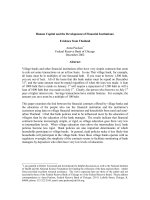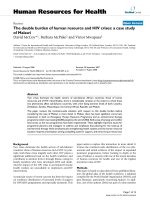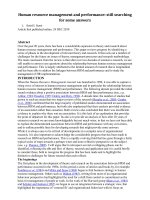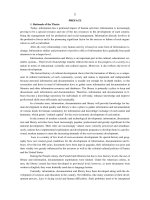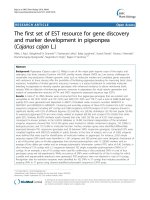Human resource and country development
Bạn đang xem bản rút gọn của tài liệu. Xem và tải ngay bản đầy đủ của tài liệu tại đây (65.85 KB, 2 trang )
Human resource and country development
Aside from natural resources is one of the basis of economic development. Its
people is the most important resource of any country. It is important to
understand how people utilize and develop natural resources based on their
character, diligence, and creativity. In fact, humans serve as the “driver” of the
world since the direction of it depends on them.
1.Population
The Philippines officially known as the Republic of the
Philippines (Filipino:Republika ng Pilipinas), is a sovereign island
country in Southeast Asia situated in the western Pacific Ocean. It consists of
about 7,641 islands that are categorized broadly under three main
geographical divisions: Luzon, Visayas, and Mindanao. The capital city of the
Philippines is Manila and the most populous city is Quezon City; both are part
of Metro Manila.
To the north of the Philippines across the Luzon
Strait lies Taiwan; Vietnam sits west across the South China Sea; southwest
liesMalaysia in the island of Borneo across the Sulu Sea, and to the south
the Celebes Sea separates it from other islands ofIndonesia; while to the east
it is bounded by the Philippine Sea and the island-nation of Palau. Its location
on the Pacific Ring of Fireand close to the equator makes the Philippines
prone to earthquakes and typhoons, but also endows it with abundant natural
resources and some of the world's greatest biodiversity. At approximately
300,000 square kilometers (115,831 sq mi), the Philippines is the 72nd-largest
country in the world.
With a population more than 100 million people, the Philippines is
the seventh-most populated country in Asia and the 12th most populated
country in the world. An additional 12 million Filipinos live overseas,
comprising one of the world's largestdiasporas. Multiple ethnicities and
cultures are found throughout the islands. In prehistoric times, Negritos were
some of the archipelago's earliest inhabitants. They were followed
by successive waves of Austronesian peoples. Exchanges with
Chinese,Malay, Indian, and Islamic states occurred.
Then,various nations were established under the rule
of Datus, Rajahs, Sultans orLakans.
2.
Currently the Philippines remained strong rise in the number of
employees and Thailand and Vietnam beyond to become the No. 2
country in ASEAN to the people in the working age, 2050, the
number of employees in the Philippines will reach 100 million
people, equivalent to 50% of Indonesian workers in the same
period
The Philippines is one of the largest labor exporter in the region.
Philippine workers who go around the world, the number of
employees abroad took an average of about 5 million people and
GDP per contest reaches 18-20 billion / year. Long, Philippine labor
export has considered as one of the foreign economic sector
weighted by country and there are urinary experience to
strengthen labor export and financial management of labor export.
3.
The structure of the labor force is not commensurate with the economic
structure
Structure of the industry - agriculture - the service is still imbalanced
labor structure in this sector
In 2010, the agricultural sector accounted for less than one fifth (16.8%)
of GDP but accounts for 1/3 (33.2%) of the total number of
employees in the country. Conversely third industry GDP
contribution but only use 15% of workers nationwide. However the
proportion of the total product is 49.7% service sector, quite
matches the structure of labor in the sector is 51.8%
the Philippines unemployment improved over the years
down from 8.3% in 2006 to 5.8% in 2015 but the unemployment rate is
still high compared with other countries in the region.


